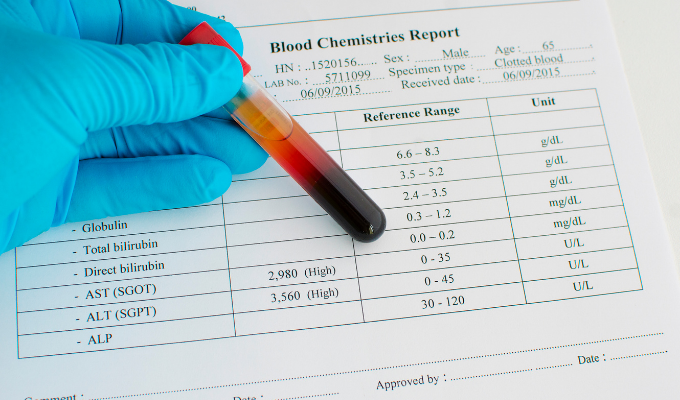What Is Genetic Testing?
Dr. Brandy Gunsolus explains the differences between the two types of genetic testing and how the tests can assist with patient care.
How to Best Approach Your Care Team About Unusual Lab Results
Medical laboratory scientist Dr. Kyle Riding shares advice for patients to advocate for their health.
Are Normal Values of Lab Tests Race-Dependent?
Dr. Kyle Riding shares lab test patients who sometimes show variation and which patient groups show generally show consistency.
What Urinalysis Tests Are Used to Check for Various Illnesses?
Dr. Kyle Riding explains visual signs checked in urinalysis, the reasons for checking specific levels, and how to advocate for yourself if you notice changes in your test results.
What Is the Importance of a Urinalysis?
Dr. Kyle Riding shares insight about the different test balances and medical conditions that can be monitored or picked up via urinalysis.
How Does Alcohol Consumption Impact Your Liver?
Dr. Kyle Riding explains how the liver can be impacted by moderate and excessive alcohol consumption – and an enzyme that can indicate alcohol overconsumption.
What Is Prothrombin Time?
Dr. Kyle Riding explains the importance of prothrombin time, its function in the body, and how providers can help ensure a balance for the patient.
Are Low Values of Liver Enzymes Concerning?
Dr. Kyle Riding shares insight about what low liver enzymes can mean and cases when low levels can be medical concerns.
What Liver Enzymes Are Included in an LFT Panel?
Dr. Kyle Riding explains the types of liver enzymes examined in liver function test panels and how the enzymes function in the body.
What Can Elevated Levels of Bilirubin Indicate?
Dr. Kyle Riding shares insight about the role of bilirubin and what elevated levels can signal in laboratory tests.
What Is a Liver Function Test (LFT)?
Dr. Kyle Riding explains the liver function test (LFT) and how the liver is involved in vital metabolic and synthesizing functions in the body.
What Is the Relation Between Glucose Levels and Hemoglobin A1C?
Dr. Kyle Riding explains the tests of blood sugar levels versus hemoglobin A1c, the role of natural sugars in the diet, and which test helps in the diagnosis of diabetes.
What Can Be Learned From Trends and Changes in Our Blood Tests?
Dr. Kyle Riding explains reasons that changes may be seen between two blood tests, trends that may signal a medical condition when viewed over time, and advice to patients on how to advocate for themselves.
Do Blood Test Reference Ranges Vary From State to State?
Dr. Kyle Riding explains how blood test reference ranges are calculated by geographic location and what may be recommended if results fall outside the laboratory range.
Are Deficiencies Seen in Blood Tests of Those on Vegan Diets?
Dr. Kyle Riding shares advice on nutrient levels for your healthcare providers to monitor and conditions that can occur from inadequate nutrient levels.
Why Has Race Been Used to Calculate an eGFR?
Dr. Kyle Riding explains why a race correction factor was created and what patients of African descent can do to ensure the best kidney health monitoring.
What Is an Estimated Glomerular Filtration Rate?
Dr. Kyle Riding explains what estimated glomerular filtration rate measures and the normal range for healthy adults.
What Is the Purpose of a Blood Urea Nitrogen (BUN) and Creatinine Test?
Dr. Kyle Riding explains how BUN and creatinine tests are used exactly, the function they test in the body, and possible conditions that may be flagged with the tests.
Why Is a Basic Metabolic Panel Important?
Dr. Kyle Riding explains the various functions that can be analyzed in an BMP test and potential medical conditions that can be detected via BMP.
What Would Warrant a CBC Test Outside of an Annual Physical?
Dr. Kyle Riding explains how CBC measurements can vary around the world and how age and gender impact reference ranges.




















